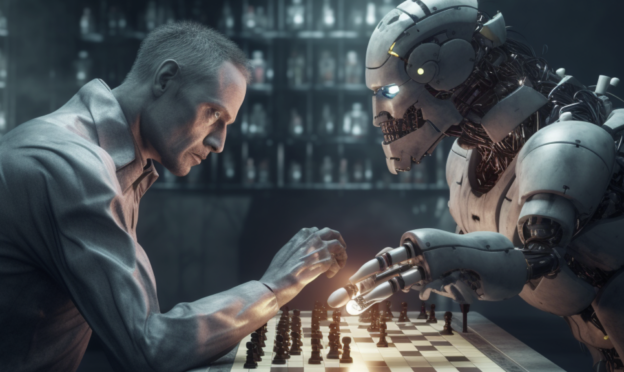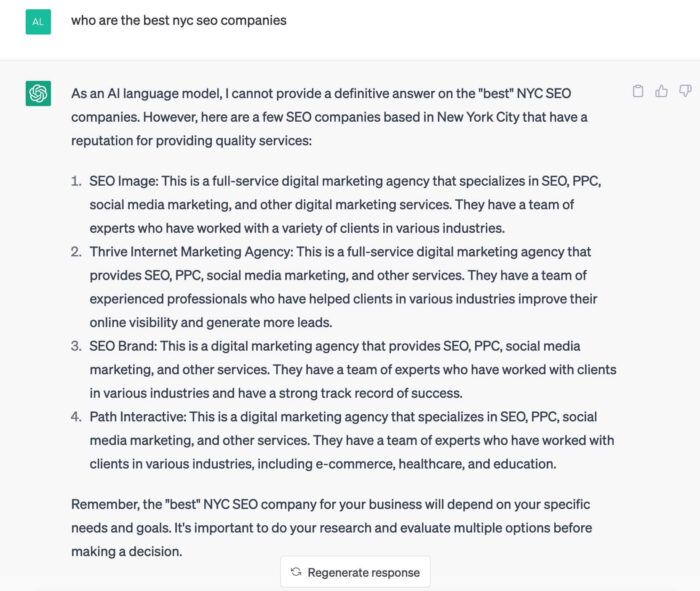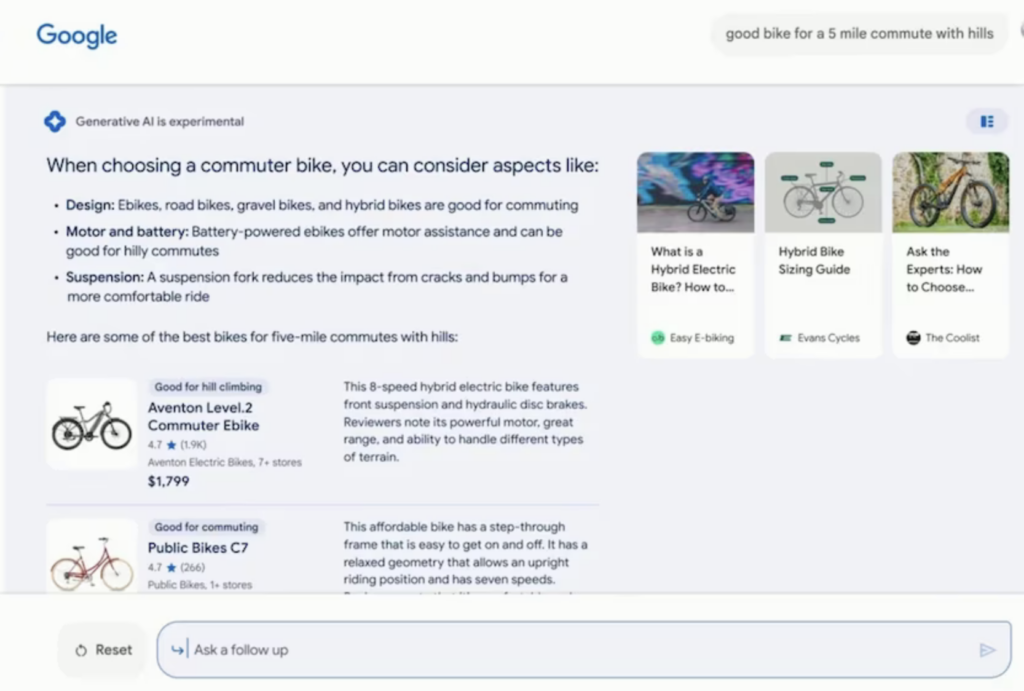
The future of Search is now questionable
As artificial intelligence (AI) continues to advance its capabilities in search marketing, it takes up space in organic results, and is complicating the ability rank in organic results. With mounting advancements, there is growing speculation that AI will perhaps replace organic search results altogether.
AI has changed the way we interact with technology, from voice assistants like Siri or Alexa, to the various recommendation systems that we use, for instance, when shopping online, and based on viewing history with streaming services. AI has similarly changed the search world, taking advantage of machine learning via search engines that are able to provide increasingly useful search results and recommendations.
The future of Artists is now questionable
In a disturbing way, the artist may consider panicking, having received a quick start with applications like Midjourney, which can create millions of illustrations (for educational publishing) within seconds. The featured image at the top of this article was created in thirty seconds using the Midjourney AI.
As a former illustrator, I see Midjourney essentially as a super-cheap replacement for hand-painted artwork. The publishing industry is always looking for the cheapest yet good art for covers, and now it has the ability to produce “decent” art in seconds for pennies. All “AI is writing ART” is now in the public domain, and anyone can reuse it or publish it – all while being unoriginal.
The future of Writers is now questionable
AI can produce content using many different methods, including natural language generation (NLG), which allows machines to generate text based on user inputs or numerous datasets. Thus, many writing assistants utilize AI technology to assist writers in improving their writing by offering suggestions related to grammar, writing style, and word tone.
Artificial intelligence can generate text, but it cannot replace human writers entirely. Writing is a creative process involving critical thinking, analysis, and interpretation – all human skills that machines are incapable of engendering. AI can create content given certain criteria, but at this point in time, it can never match the depth of human thought or the nuance that accompanies such thought.
However, as AI progresses and eventually develops itself, this can change quickly. There are lots of stories regarding how people have used ChatGPT for writing, term papers, thesis, website content, and even part of this article, slightly modified. AI allows you to produce very good writing in less than ten seconds, the same as it does with art or search results. So that should concern writers as well.
The future of SEO is now questionable
One of the most significant ways AI can impact SEO is through its ability to understand natural language processing (NLP). NLP is the ability of machines to understand and interpret human language, making it easier for them to identify the intent behind search queries and provide more relevant results. This means that search engines powered by AI can better understand the meaning behind search queries and provide more accurate results, making SEO more challenging unless, of course, the SEO is using AI creatively to develop the content. Like this entire article. Which is based on AI and manually elaborated on (pretty heavily) since AI is still limited and tends to be a bit repetitive in statements at the moment.
Another benefit of AI integrated into search is that AI can identify patterns and trends in search behavior, allowing it to predict what users are looking for and deliver more targeted results. This can make it more difficult for businesses to rank for specific keywords or phrases, as AI-powered search engines may prioritize content that matches the user’s search intent over content optimized for specific keywords. This appears to be one of the more recent models seen on search engines.
Since authority is a major factor in current ranking algorithms, it’s questionable how a search engine or AI that is used as a search engine, would understand authority with referencing like links. Below I theorize one strategy which is imperative for today’s SEO anyway, so it may indicate AI elements of search results already.
While AI is making SEO more challenging, it’s not necessarily replacing it. Instead, it’s changing the way businesses need to approach SEO. The E-E-A-T strategy for SEO still holds weight here. As search engines become more intelligent, or even become replaced by AI altogether, businesses need to focus on creating high-quality, relevant content that answers the user’s search intent rather than just targeting specific keywords. This means that businesses need to put more emphasis on creating content that provides value to their audience, rather than just optimizing for search engines.
Matching Google’s E-E-A-T is imperative for businesses in 2023. As AI integrates and eventually becomes the algorithm, influencing it will become harder. It’s important to understand how it currently works.
When searching for the Best SEO Companies in NYC, AI uses data from third-party websites and simply returns what it finds and also gives a disclaimer. It’s pulling information from web sources, so instead of links, being a reference and/or being listed on websites would be a way to influence AI and a replacement for link building and the link itself no longer matters the reference and information does.
So modern-day SEO needs to take this into consideration as part of its SEO strategy. Links may not be as necessary for SEO of an AI search engine. However, this would make it clear that AI marketing services will be very important. So, in theory, the smart SEO strategies of the past two decades, still work in the AI model search engine, they just need to be thought of differently.
The future of Search Engines is now questionable
With Google/IO presentations showcasing how Google plans to integrate AI, one can say that the priority of AI is higher than Google’s own organic search results, making you wonder if AI has replaced Google’s algorithm completely, or will in the future. If it does replace Google results, it levels the playing field, as anyone can simply license AI and develop a competitive search engine in seconds.
Wow! Imagine that, your own search engine in seconds, just like your own art in seconds.
So the future of Search Engines is now questionable as well. Search leadership is more likely to change since this makes it appear that Google, themselves, feel/admit that AI results are better than the past 25 years of Google’s organic search algorithm.
LOL Yes, this is a bold statement and a bit of a push, but look at how Google is planning to put AI above its own organic results…What does it say to you?
While Google is the current search leader, an AI competitor will likely level the playing field as AI develops over time. How we use search to find information, products, and services can change as AI develops itself and even presents results as it sees fit.
This opens up the possibility that Influencers and marketers can push new AI products like a new AI search engine (a ChatGPT derivative/license not owned by a major company), and even state how systems like Google’s search algorithm, are now archaic.
It will be interesting to see if the crazy rush to implement AI into search engine results becomes the cause and start of new ways to search and new AI engines. As one search engine’s AI will no longer be better or more sophisticated than the other, as it’s all simply AI and replaced the same way an artist or writer can be replaced with AI.
While AI is still in its infancy, it’s important to watch and see if an AI engine will replace a search engine, and if so, does this mean that one AI Engine is better than any other AI Engine? Search is becoming more exciting, and how to market to AI Engines is also exciting and a breath of fresh air to someone like me who has been marketing websites since 1998. Challenges are fun, and AI represents the next iteration of SEO challenges. I do predict a huge change in search, which may also include a change in major players.



